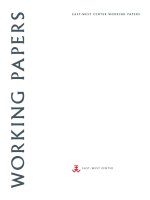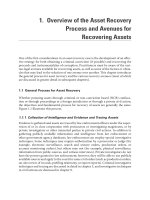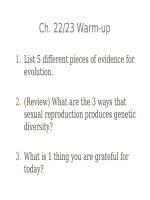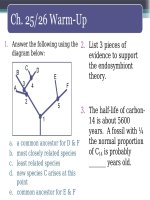Lecture Art of Leadership and Motivation - Lecture 18
Bạn đang xem bản rút gọn của tài liệu. Xem và tải ngay bản đầy đủ của tài liệu tại đây (1.25 MB, 34 trang )
Art of Leadership & Motivation
HRM – 760
Lecture - 18
FACILITATOR
Prof. Dr. Mohammad Majid Mahmood
Habits of Highly Effective
Leaders-II
2
Habit 1:
Be proactive
3
“Anytime we think the problem is out there,
that thought is the problem”
4
Habit 1: be
proactive
Responsibility: “Response Ability”, the ability to choose your
response. Highly proactive people recognize that
responsibility.
Reactive people are those who are affected by their physical
and social environment. If the weather is good they feel
good, if it isn’t it affects their attitude and their performance.
John McEnroe
PROACTIVE PEOPLE CARRY THEIR OWN WEATHER
WITH THEM.
5
Habit 1: be
proactive
LANGUAGES OF PROACTIVE AND REACTIVE
PEOPLE
REACTIVE
•
•
•
•
•
•
•
There’s nothing I can do(External
factors).
That’s just the way I am.
He makes me so mad.
They won’t allow that.
I have to do that.
I can’t(target).
I must.
PROACTIVE
•
Let’s look at our alternatives.
•
•
•
I can choose a different approach.
I control my own feelings.
I can create an effective
presentation.
I will choose an appropriate person.
I choose.
I prefer.
•
•
•
6
Habit 1: be
proactive
CIRCLE OF CONCERN AND
CIRCLE OF INFLUENCE
Circle of concern is our health, problems at work, the
national debt, nuclear war, etc.
Its apparent that there are some over which we have
no real control and others that we can do something
about, which is the Circle of Influence.
7
Habit 1: be
proactive
CIRCLE OF CONCERN AND
CIRCLE OF INFLUENCE
PROACTIVE PEOPLE FOCUS THEIR EFFORTS ON THE CIRCLE OF
INFLUENCE. THEY WORK ON THINGS THEY CAN CHANGE, HAVE
HIGH POSITIVE ENERGY CAUSING THEIR CIRCLE OF INFLUENCE
TO INCREASE
REACTIVE PEOPLE FOCUS THEIR EFFORT ON THE CIRCLE OF
CONCERN. THEY FOCUS ON WEAKNESS OF PEOPLE, PROBLEMS
IN ENVIRONMENT AND CIRCUMSTANCES. THE NEGATIVE
ENERGY GENERATED BY THIS FOCUS CAUSES THEIR CIRCLE OF
INFLUENCE TO SHRINK.
8
WHERE DOES THE RESPONSE COME FROM?
STIMULUS
PROACTIVE
Self Awareness
Imagination
Conscience
Independent Will
FREEDOM
TO
CHOOSE
ACCORDING
TO
VALUES
Vs
RESPONSE
REACTIVE
Genetic (G. Father DNA)
Psychic (Father)
Environmental
(boss, spouse)
9
Habit 1: be
proactive
“BE
PROACTIVE“
RESPONSIBILITY
RESPONSE
+
ABILITY
ABILITY TO CHOOSE YOUR RESPONSE
10
Habit 2:
Begin with the end in
mind
11
Habit 2:
Begin with the end in mind
It is based on imagination
It is based on the principle that all things are created
twice. There is a mental (first) creation, and a physical
(second) creation.
The physical creation follows the mental, just as a
building follows a blueprint.
12
Habit 2:
Begin with the end in mind
Begin with the End in Mind means to begin each day, task, or
project with a clear vision of your desired direction and
destination, and then continue by flexing your proactive
muscles to make things happen.
One of the best ways to incorporate Habit 2 into your life is to
develop a Personal Mission Statement.
It focuses on what you want to be and do. It is your plan for
success. It reaffirms who you are, puts your goals in focus, and
moves your ideas into the real world. Your mission statement
makes you the leader of your own life
13
Habit 3:
Put first things first
14
“Things which matter most should never
be at the mercy of things which matter
least”
Goethe
15
Habit 3: put first things
first
The key to success
• Don’t simply prioritize your
work; you need to
necessarily work on your
priorities
• The key is not to prioritize
what is on your schedule, but
to schedule your priorities
16
Habit 4: Think Win/win
17
Habit 4: Think Win/Win
Think Win-Win isn't about being nice, nor is it a
quick-fix technique. It is a character-based code
for human interaction and collaboration.
Most of us learn to base our self-worth on
comparisons and competition.
We think about succeeding in terms of someone
else failing--that is, if I win, you lose; or if you
win, I lose.
18
Habit 4: Think Win/Win
Win-win is a frame of mind and heart that
constantly seeks mutual benefit in all
human interactions.
Win-win means agreements or solutions
are mutually beneficial and satisfying.
We both get to eat the apple, and it tastes
pretty good!
19
Habit 4: Think Win/Win
It’s not your way or my way, it’s a better
way
20
Habit 5:
SEEK FIRST TO UNDERSTAND,
THEN TO BE UNDERSTOOD
If you're like most people, you probably seek
first to be understood; you want to get your
point across. And in doing so, you may ignore
the other person completely, pretend that you're
listening, selectively hear only certain parts of
the conversation or attentively focus on only
the words being said, but miss the meaning
entirely. So why does this happen?
21
Habit 5:
SEEK FIRST TO UNDERSTAND,
THEN TO BE UNDERSTOOD
Because most people listen with the intent to
reply, not to understand.
22
Habit 6:
Synergize
“The whole is greater
than the sum of its parts”
SYNERGY means 1+1= 11 & not
23 2
EFFECTIVE PEOPLE
Habit 6:
synergize
INEFFECTIVE PEOPLE
HABIT 6
Synergize.
Effective people know that
the whole is greater than the
sum of the parts.
Compromise, Fight, or Flight.
Ineffective people believe the
whole is less than the sum of
the parts.
They value and benefit from They try to “clone” other
differences in others, which people in their own image.
results in creative
cooperation and teamwork.
Differences in others are
looked upon as threats. 24
Habit 6:
synergize
To put it simply, synergy means "two heads are better
than one."
Synergize is the habit of creative cooperation. It is
teamwork, open-mindedness, and the adventure of
finding new solutions to old problems. But it doesn't
just happen on its own.
It's a process, and through that process, People bring
all their personal experience and expertise to the table.
25









